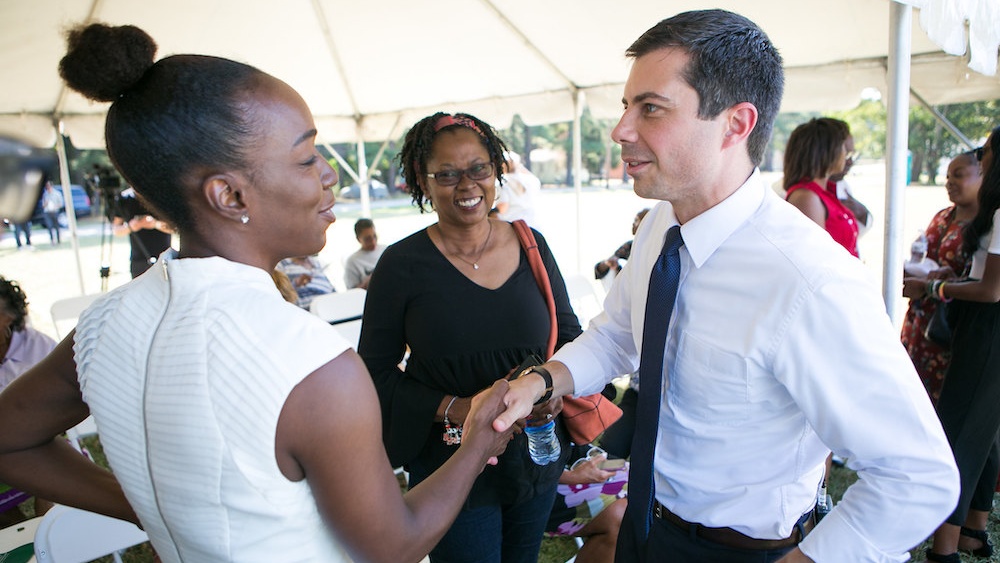If you’re interested in sharing your opinion on any cultural, political or personal topic, create an account here and check out our how-to post to learn more.
____
At a tech incubator in Los Angeles a few months ago, I saw the promise of our country — and how far we still have to go. The incubator I was touring, Vector90, has done a remarkable job developing entrepreneurs from underrepresented backgrounds. But it’s also seen its founder, Nipsey Hussle, fatally shot earlier this year. While I was there I met a 14-year-old from Noblesville, Indiana — just a few hours south of my hometown of South Bend — who’s interested in coding. But he also told me about being called racist slurs at his school — in 2019.
It’s a stark reminder of the battles Black Americans face everyday. Close to 60% of Black entrepreneurs worry about not getting access to a loan, and many schools are almost as segregated as they were before Brown v. Board of Education. Nearly 4.3 million Black households lack access to broadband. For every now-recognized figure like Katherine Johnson, hand-calculating rocket trajectories to put a man on the moon, there is another hidden figure who may never have the chance to excel.
These inequities are the result of racist policies that were put in place intentionally — often within living memory — and we must be equally intentional in addressing them. That’s why I have proposed a Douglass Plan for Black America, as ambitious as the Marshall Plan that rebuilt Europe, to tackle systemic racism in every aspect of American life. Our plan would lay a strong foundation for racial justice and spur Black entrepreneurship, lifting up our country as a whole.
Just as a dollar saved compounds over time, so does a dollar stolen. This generational theft is a large part of the reason why, for every $100 in wealth a white family has, the average Black family only has $5.04. To close this wealth gap and promote greater economic security within the Black community, the Douglass Plan will triple the number of entrepreneurs from underserved areas — particularly ones of color — within 10 years. Inspired by Black business pioneers Madam CJ Walker and Reginald Lewis, we’re calling it our Walker-Lewis Initiative, and through it we’ll create over 3 million new jobs.
We’ll achieve that goal through a number of policies. We’ll launch a federal fund, modeled on a successful program in Maryland, that will co-invest in entrepreneurs of color, so that young coder from Noblesville can get a leg up in fulfilling his aspirations. Every student who was eligible for Pell Grants while in school will have their college loans deferred and forgiven if they start and maintain a business employing at least three people within five years of leaving school. And under my administration, the federal government will set a new and far higher target of awarding 25% of federal contracts to minority and women-owned firms. This proposal alone could inject more than $100 billion in communities of color.
Knowing the extraordinary role that HBCUs play as engines of empowerment, my administration will dedicate $50 billion to these schools and other minority-serving institutions. By significantly increasing investments in these institutions, we’ll help educate the next generation of Black doctors, artists and entrepreneurs.
More broadly, we’ll lift up Black America by tackling inequalities across every facet of life, from healthcare and housing to education and criminal justice. We’ll deliver a 21st Century Homestead Act so that people living in historically redlined communities can acquire properties and build wealth instead of being forced out by gentrification. With Black women dying from maternal complications at triple the rate of white women, and Black men facing a greater risk of diabetes, we’ll designate Health Equity Zones to help communities target strategies for their communities and recruit more Black doctors, nurses and health professionals. Our Internet for All initiative will bring broadband to underserved communities, so that you can get ahead whether your backyard is a high-rise or a cornfield. And to ensure that the voices of Black Americans are heard, we’ll pass a 21st Century Voting Rights Act and make it easier — not harder — to vote.
Running for office is an act of hope. And, ultimately, I left Vector90 filled with that sense of hope. It’s clear that the potential, the hunger to contribute and create, is everywhere in our country. If we can summon the courage to bring down the systemic barriers that have fenced off opportunity for too many for too long, then we can bring about a better future not only for Black America, but for all of America.
____
Pete Buttigieg is a Democratic presidential candidate. He is currently the Mayor of South Bend, Indiana.
